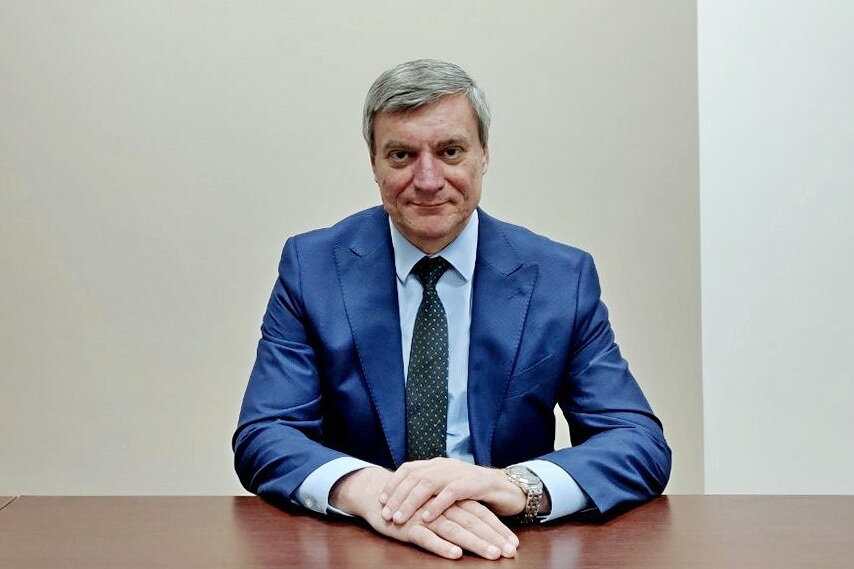The top management of state-run defense production giant UkrOboronProm has directly accused the Ministry of Strategic Industries of derailing the country’s defense production reform and of illegally taking control of key enterprises and institutions.
The statement came out late on Nov. 18 following an avalanche of unofficial reports of a sharp disagreement between the UkrOboronProm’s pro-reform leadership and the recently-created strategic production ministry headed by Oleh Uruskiy.
Uruskiy’s ministry, which was created in July to shape policies for key state-run industries, has been repeatedly accused by anti-graft watchdogs of non-transparent management reshuffles at crucial defense enterprises and highly-centralized control over the defense industry.
The industry’s reform was expected to transform UkrOboronProm — an ill-fated arms concern haunted by endemic corruption and low efficacy — into several corporate holding companies managed in accordance with modern business standards.
But now the UkrOboronProm’s pro-reform team headed by Ihor Fomenko has stepped out saying that the defense giant “is worried about (the reform’s) termination and the interference in (UkrOboronProm’s) business activities by the Ministry of Strategic Industries,” something the ministry has strongly denied.

Aivaras Abromavicius, then director-general of Ukraine’s state-run defense production giant UkrOboronProm, delivers a speech during a celebration ceremony at the Antonov airfield in the town of Hostomel near Kyiv on Oct. 18, 2019. Abromavicius resigned in October 2020. (Kostyantyn Chernichkin)
In its statement, UkrOboronProm said that Uruskiy’s ministry had promised the Ukrainian parliament, President Volodymyr Zelensky, the country’s National Defense and Security Council, as well as G7 countries’ envoys, to avoid interfering in business activities of state-run companies.
Moreover, Uruskiy had publicly endorsed the UkrOboronProm reform plan, which was also confirmed by the concern’s recently appointed acting head Fomenko in his interview with the Kyiv Post.
“Despite the promises of prompt action, the ministry has been systematically blocking the UkrOboronProm and defense industry reform for three months,” the management team stated. “Starting from day one, the ministry has interfered in UkrOboronProm’s activities in the form of verbal instructions and numerous instances of insisting.”
According to the UkrOboronProm’s management, the ministry regularly “demands and recommends” to appoint “unauthorized persons” as directors of UkrOboronProm’s key affiliates such as special export companies that have a monopoly on foreign arms deals, as well as Kyiv Armored Vehicles Factory and other major enterprises.
“Other than that, there are strong demands to sack UkrOboronProm employees liable for the security, exports, communications with government bodies, and transformations,” the statement reads.
Such actions directly contradict the Organization for Economic Co-operation and Development’s principles of government management, which Ukraine seeks to implement, according to the statement. Besides, they may indicate instances of abuse of position and conflict of interest, which pose corruption risks.
The statement also noted that only the Cabinet of Ministers was entitled to execute effective control of the defense concern controlled by UkrOboronProm’s independent supervisory board. Meanwhile, the Ministry for Strategic Industries is only entitled to shape defense production policies, without managing the industry directly.
“We consider such actions unacceptable and undermining trust to proclaimed intentions, goals, and tasks,” the defense concern stated, calling upon the country’s leadership to focus its attention on the situation.
UkrOboronProm also accused the ministry of failing to initiate the development of a national strategy for the defense industry and of suspending a range of draft bills necessary for the reform, providing no alternatives or amendments.
Besides, no statutory instruments have been introduced for the new bill on defense procurement, which was approved in July and due to come into force starting in 2021.
“This may halt the whole process of signing contracts with arms and hardware manufacturers for the Armed Forces,” the statement reads.
UkrOboronProm also said that there has been no solution to the critical situation regarding the country’s program to build capabilities to manufacture munitions.

Oleh Uruskiy, minister of the Ministry for Strategic Industries created in July 2020 to shape policies for key state-run industries including defense production. (ProgressTech-Ukraine)
A month before that, UkrOboronProm was asked to cede its leading role in defense reforms in favor of the Ministry for Strategic Industries, as Mustafa Nayyem, the concern’s deputy director-general stated on Facebook on Nov. 18.
“We agreed in the hope of finding partners and like-minded reformers. Unfortunately, that was not the case. Instead of partnership, we faced systemic protraction in the development of strategic documents, the blocking of our draft bill and the reform as a whole,” Nayyem wrote.
Key anti-graft watchdogs, such as State Watch and Independent Defense Anti-Corruption Committee, fully supported the UkrOboronProm’s public address.
The outburst occurred a day after the government sacked the head of the country’s State Space Agency Volodymyr Usov. The decision was made overnight behind closed doors, with no public explanations or accusations directed at the official.
Upon that, according to a reorganization plan advocated by Uruskiy, the Ministry of Strategic Industries is expected to assume control of the country’s aerospace production cluster that will unite Kyiv-based aircraft manufacturer Antonov and Dnipro-based spacecraft company Pivdenmash and design bureau Pivdenne.
The team created by former Economy Minister Aivaras Abromavicius, and former UkrOboronProm head, was to eliminate UkrOboronProm as it is and manage a cluster of several industry-based military production centers united in a corporatized holding company — the Defense Systems of Ukraine.
The Ministry for Strategic Industries issued a response as late as next afternoon, calling the UkrOboronProm statement “a surprising bold act” and an attempt to present the defense concern’s top management teams as an “exclusive political player” entitled to determine reform provisions and give assessments of government agencies.” The ministry also accused UkrOboronProm of incompetence and attempts to derail the fulfillment of “tasks stated by the president and enshrined in legislation.”
“They are probably not aware of ongoing cooperation of the ministry, the Verkhovna Rada committees, and the concern, which continues for months and is aimed at perfecting current legislation and developing new regulations necessary to reform the defense production industry,” the ministry’s statement reads.
